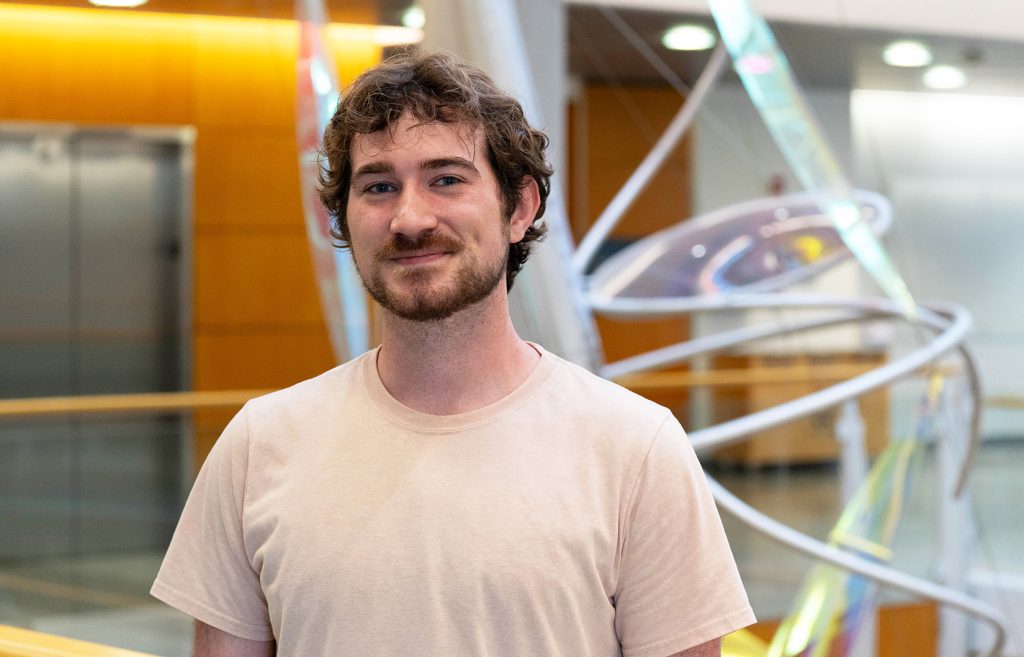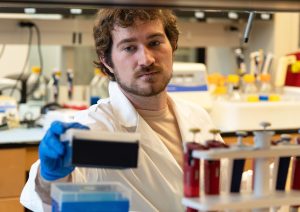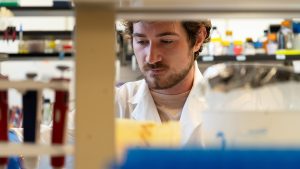
Story and photos by Logan Jackson
- Nick Ice – senior biochemistry major
- Mentor: Kamal Singh, assistant professor of veterinary pathobiology; director of the Molecular Interactions Core
When Nick Ice arrived at the University of Missouri, he was looking for an opportunity to combine his interest in science with his desire to help others. Those passions led him to research. For the past two years, Ice has been an undergraduate research assistant in the lab of Kamal Singh, an assistant professor of veterinary pathobiology whose research includes studying the basic science behind protein interactions. Some of these interactions include viral, parasitic, bacterial and mammalian proteins.

This summer, Ice is leading his own project tied to a specific parasitic infection, malaria.
“My research primarily focuses on medication design tied to malaria,” said Ice, a senior biochemistry major. “My project aims to create a new medication for malaria, as there is quite a bit of resistance developing against the current treatments because they’ve been used for so long. Some of the medications weren’t even designed for malaria – they just happened to be effective.
“We’re obviously a long, long way from something like clinical trials, but it’s been really interesting to research the development of a treatment.”
Ice said there is a specific enzyme, DNA polymerase, that’s vital in how malaria functions. He is investigating ways to inhibit the enzyme.
“When you stop that enzyme from working, you get an accumulation of DNA breaks,” Ice said. “The infection can’t continue to function when enough damage is present. Within my project, I am pulling out that single enzyme that we’ve purified and testing different medications against it to see if there is one that can inhibit the DNA polymerase.”
The research focus of Singh’s lab has been the perfect fit for Ice. He’s had an interest in medicine – especially tied to infectious diseases – for a while. His research efforts have allowed him to explore those interests and learn more about the field.
“The atmosphere in Dr. Singh’s lab is really amazing,” Ice said. “He’s very personable and super supportive of his students.”

Ice has been able to refine his research skills throughout his two years in the lab. The fact that his work has very real-world implications isn’t lost on him, either.
“The idea that the work I’m doing could potentially impact millions of people is incredible to think about,” Ice said. “A disease like malaria affects so many people, but it can do the most harm in children and pregnant women – two demographics that are so important to protect. I’m beyond thankful for the opportunity.”
Ice’s research is made possible through the Cherng Summer Scholars program. A nine-week research or creative scholarship program for Mizzou students who are pursuing the Honors Certificate, the Cherng Summer Scholars program allows students to participate in individually designed projects under the mentorship of a Mizzou faculty member. The program is supported by a gift from Peggy and Andrew Cherng and the Panda Charitable Foundation.
“Interdisciplinary research is so, so valuable,” Ice said. “It’s been incredible to be part of the Cherng Summer Scholars program and learn more about the variety of projects that are being done across campus. The discussions have been really interesting, too, as we talk about numerous topics, such as the ethical dilemmas that each of us face in our fields.”